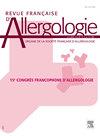Food allergy in adults. Is there a difference between HIV and non-HIV patients?
IF 0.3
4区 医学
引用次数: 0
Abstract
Background
Human Immunodeficiency Virus infection is known to cause significant immunological changes, including a shift towards a Th2-dominant immune response, which is typically associated with allergic conditions. However, the relationship between HIV infection and the incidence of food allergies remains unclear.
Objective
This study aims to investigate the incidence of food allergies in HIV-infected patients compared to a non-HIV population.
Methods
This retrospective cohort study utilized observational data including individuals diagnosed with HIV between 2004 and 2023. A control group matched for age and sex (1:60) was created from non-HIV individuals. Data on allergic conditions were extracted using ICD9 codes, and statistical analyses were conducted using Cox proportional hazards models to assess the effect of HIV on food allergy incidence over a 10-year follow-up period.
Results
The study included 1616 HIV-positive patients and 95,773 controls. While higher rates of asthma and atopic dermatitis were observed in the HIV group, no cases of food allergy were detected among HIV patients, compared to 185 cases in the non-HIV cohort. The adjusted hazard ratios indicated that factors such as asthma, atopic dermatitis, vitamin D insufficiency, and kidney transplantation were associated with increased food allergy risk in the non-HIV population.
Conclusion
Despite the Th2-dominant immune environment associated with HIV infection, no increased risk of food allergy was observed in HIV-positive individuals over a 10-year period. This suggests that the immunological alterations caused by HIV may not predispose patients to food allergies as they do to other allergic conditions.
成人食物过敏。HIV患者和非HIV患者有区别吗?
已知人类免疫缺陷病毒感染会引起显著的免疫变化,包括向th2显性免疫反应的转变,这通常与过敏性疾病有关。然而,HIV感染与食物过敏之间的关系尚不清楚。目的研究hiv感染者与非hiv感染者食物过敏的发生率。方法本回顾性队列研究利用了2004年至2023年间诊断为HIV的个体的观察数据。一个年龄和性别匹配的对照组(1:60)是由非hiv感染者组成的。使用ICD9编码提取过敏情况数据,并使用Cox比例风险模型进行统计分析,评估HIV对10年随访期间食物过敏发生率的影响。结果该研究包括1616名hiv阳性患者和95773名对照组。虽然在HIV组中观察到较高的哮喘和特应性皮炎发生率,但在HIV患者中没有发现食物过敏病例,而在非HIV组中有185例。校正后的风险比表明,哮喘、特应性皮炎、维生素D不足和肾移植等因素与非hiv人群食物过敏风险增加有关。结论:尽管th2显性免疫环境与HIV感染相关,但在10年的时间里,HIV阳性个体的食物过敏风险并未增加。这表明,HIV引起的免疫改变可能不会像对其他过敏性疾病那样使患者易患食物过敏。
本文章由计算机程序翻译,如有差异,请以英文原文为准。
求助全文
约1分钟内获得全文
求助全文
来源期刊

Revue Francaise d Allergologie
Medicine-Immunology and Allergy
自引率
33.30%
发文量
349
期刊介绍:
La Revue Française d''Allergologie : un véritable forum pour faire connaître des travaux originaux et permettre la diffusion de l''information auprès de toutes les spécialités concernées par les pathologies allergiques. La Revue Française d''Allergologie (8 numéros par an) est au carrefour de nombreuses spécialités - dermatologie, pédiatrie, ORL, pneumologie, ophtalmologie, médecine interne - qui, toutes, ont à traiter des maladies allergiques. Les symptômes des allergies fondés sur des mécanismes communs sont le plus souvent associés et se succèdent chez un même patient. En forte progression depuis 20 ans, les maladies allergiques sont dans l''attente de perfectionnements et d''avancées thérapeutiques qui permettront aux nombreux patients qui en sont atteints de mieux vivre avec leurs allergies. La Revue Française d''Allergologie se veut donc un véritable forum de discussions et d''échanges entre tous les spécialistes confrontés aux pathologies
 求助内容:
求助内容: 应助结果提醒方式:
应助结果提醒方式:


